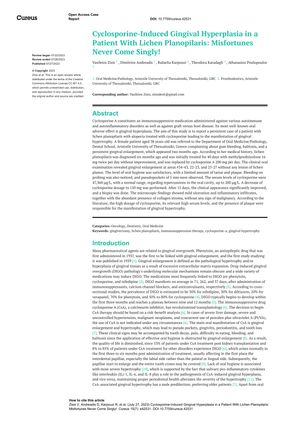Cyclosporine-Induced Gingival Hyperplasia in a Patient With Lichen Planopilaris: Misfortunes Never Come Singly
July 2023
in “
Curēus
”

TLDR A patient's gum problems worsened after using cyclosporine for a scalp condition, but improved with a lower dose.
A 38-year-old female patient with lichen planopilaris and alopecia experienced gingival hyperplasia after being treated with cyclosporine A. Initially, she was treated with methylprednisolone without improvement, leading to a switch to cyclosporine A at a dosage of 200 mg per day. Two months later, she presented with gum bleeding, halitosis, and gingival enlargement. Clinical examination showed satisfactory oral hygiene but revealed gingival enlargement in specific areas, bleeding on probing, and pseudopockets. Her serum cyclosporine levels were significantly above the normal range for oral cavity repercussions (47,360 μg/L compared to the normal upper limit of 200 μg/L). After reducing the cyclosporine dosage to 150 mg, her condition improved within 15 days. A biopsy confirmed the absence of malignancy and indicated that the high dosage of cyclosporine, elevated serum levels, and the presence of plaque contributed to the gingival hypertrophy.





